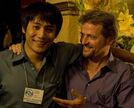The universe didn't explode for no reason, it needed a pull-up. The Big Bang doesn't come out of nowhere, but needs an intriguer. ——Liu
Xing's lines in the play, inscribed to
watch this movie, because "New Weekly" recommended it at the beginning of the year, and introduced Related early universe theories. Before watching it, I specifically didn't watch the introduction of the film, thinking that if I could understand this film, the director and screenwriter of the film would be awesome. The truth is, I get it, because this time, it has nothing to do with dark matter.
The film tells the story of a Chinese student named Liu Xing who came to a certain Niu University in the United States to study for a doctorate in astrophysics and cosmology. The previous story was a bit bland. Like all Chinese students who came to the United States in the 1980s, Liu Xings had no money. They picked up furniture and electrical appliances thrown away by Americans, attended church activities to get enough food, and sat on the roof to drink beer when they had nothing to do. Think about the future; when you meet a mentor, do your best, be conscientious, and complete all the homework assigned by the mentor with sincerity. Just when I was a little bored, a person appeared. I don't know what his original name was, but in order to gain a foothold in the United States, he changed his name to Lawrence Feng and talked to Liu Xing in English, although they were both Chinese. I was shocked at the time, this scene was very similar, it reminded me of a story more than ten years ago: the case of Lu Gang shooting his mentor.
As the film progressed, I gradually determined that this film must be a replay and discussion of the Lu Gang case. Sure enough, Liu Xing did not pass the defense of his doctoral dissertation, nor did he graduate. Although in the real Lu Gang case, Lu Gang obtained a doctorate, but he failed to pass the defense. Afterwards, I saw Liu Xing working as a handyman, reselling cosmetics, and finally packed up and sent his parents $10,000 saved by working and studying in the United States for 3 years. After that, like Lu Gang, he went to the award-giving scene of Lawrence Feng (Shan Linhua in the real incident) with a pistol in his arms. After shooting 5 people, he also drank the bullet and died.
Real events and the image of the Chinese people aside, this is a good film that explores relationships, psychological issues and the lives of international students. Liu Xing in the film, as his parents said, "is like a big fool who can't do anything except study". I think this is also the main reason why he finally chose to shoot Lawrence Feng and the three professors. Because his supervisor hated his talent and retaliated against him for not doing a doctoral dissertation related to his own research, he made him shut down his dissertation during the defense of his doctoral dissertation, and shut him down to get a doctorate and stay in the United States The hope of teaching has turned off his longing to pick up his parents to go to the United States for reunion. He has nothing, and there is nothing worthy of his nostalgia and cherishing, so he chose the most extreme way to release his inner pressure.
The mentor-student relationship has always been a touchy subject. "Dark Matter" is the only film I've ever seen that depicts the negative mentor-student relationship, and of course I don't see a lot of it. There are many films that describe the positive relationship between tutors and students, such as "Hot-blooded Teacher", "Rock Campus", "Dead Poets Society", etc., without exception, the tutors in these films are not only academic tutors, but also life tutors, both virtue and art. And Professor Reese in "Dark Matter" is real, but compared with these other brilliant images, it is a counter-example. Among them, there are two lines involving the relationship between the tutor and the student. One is that Liu Xing insists on studying dark matter and believes that he should have his own voice, while Lawrence Feng persuaded him to say, "We are all just assistants to Professor Ruise, and we don't need to have our own. Second, two Chinese students who lived with Liu Xing talked about the topic of their graduation thesis and said, "My topic is my supervisor's argument 10 years ago, and I'm just proving it." Liu Xing's response to this was: "Then how sorry you are for your dead brain cells."
Liu Xing has a glass-like transparent mind, ideal and pure. He has lofty ideals, "winning the Nobel Prize"; with his own ideas, watching the boiling soup, he can get a key breakthrough in the study of dark matter. But, as his parents said, he "is like a big fool who can't do anything but study". Therefore, when he faces the distance between ideal and reality, when he encounters the sensitive zone of interpersonal relationships in life, he does not know what to do. He felt that with his talent, he could gain support, applause, and admiration, but that was not what awaited him, only the jealousy and revenge of Professor Ruise. He failed to find a psychological outlet for his loss. Instead of perishing in silence, he broke out in silence. He chose the latter.
Like the international students in the 1980s, Liu Xing reported good news to his family but not bad news. Even when he was the most difficult and desolate—the dissertation was closed and his graduation was still in sight, his letter to his family was still the same as usual: Mom and Dad, I am fine in the United States. I graduated summa cum laude, a lot of colleges are vying for me to teach in the past, and I'm now thinking about which job to choose. Soon our family will be together in America. His parents didn't know if he would collapse when everything was fine with him, but when the film came to an abrupt end, when Liu Xing's mother received a phone call from the United States about the shooting incident. From another point of view, this also reflects Liu Xing's conceit. He wanted him to be in front of his family, friends, and the world as the best scholar, so his letters to his family have always been good news, even if it's fabricated good news. He always said to his classmates: "I want to win the Nobel Prize". He didn't want to go back to China sadly, so he didn't accept the suggestion to go back to China to work at the Academy of Sciences, nor did he go to a big company to find a job together. He wholeheartedly hopes that his research breakthroughs will be recognized, but he does not know that scientific research or work is a long journey. Even if inspiration is needed, long-term accumulation is also indispensable. What he doesn't even know is that sometimes, people don't need approval from others.
Liu Xing said a sentence in the film: "The Big Bang doesn't come out of nowhere, but needs an intriguer." This sentence is a pun. It not only points out the subtlety and inadequacy of the Big Bang theory, but also points out the theme of the film. Liu Xing's last extreme behavior was not a whim, but ignited anger. For his ideals, he had nowhere to go, for his own revenge and neglect, for his own situation, he ignited anger and chose to explode.
At this time, I thought of Wu Zhe, a highly educated person who is good at finding an outlet for psychological shadows and maintains a normal mind. This is a model for the new era.
Attached is the replay of Lu Gang's case: http://gezhi.org/node/535
View more about Dark Matter reviews











